QuestionHello! I have a female ferret who is about 6 years old and very playful.
Do ferrets get sores? I thought she had something stuck in her fur, but I took it out and it looks red and like it could be a scab? Then, I found another one near her shoulder. I really don't know what she can be rolling around in, so I don't think it's just something stuck in her fur. I keep her cage clean and was wondering what do ferrets get sores from?
She doesn't seem to notice the sore/scab? besides occasionally itching. Do you have any idea what it could be?
Also, I give her Ferretvite daily and she really loves it, but she's still a peanut. Is there something else I could give her to add to her diet?
AnswerHi Lauren:
Thanks for writing! You've basically asked two questions and I will address each one separately for clarity sake :-)
1. Yes, ferrets can get scabs. Sometimes they get them from wrestling around with other ferrets who occasionally will bite down too hard. An even more common cause, however, especially in an older ferret such as yours is what is called a "mast cell tumor". Don't panic. They are basically harmless. My little Kylie has had one for about four years now and it hasn't changed significantly in that time. Just every now and then I will notice a drop of dried blood in her fur, where she apparently scratches the top off of it. Here is a website from Dr. Bruce Williams, well respected ferret veterinarian, who shows a picture and talks about mast cell tumors: http://www.afip.org/ferrets/Mast/mastcell.html Hopefully that's all your little one has. If you wish, your vet can scrape the area, touch a clean slide to it and look at the slide under a microscope to examine the cells and confirm the diagnosis. It's a simple procedure and would give you peace of mind if you are very concerned. These tumors are fairly common, especially in ferrets age 5 and older, so that would be my *guess* - but of course for a real diagnosis you will need to have your vet test her.
2. As far as your little "peanut's" size (I love that nickname :-), some ferrets are just bred to be smaller than others. You can do the best for your ferret by being sure she is getting the highest quality nutrition you can. Sometimes nutrical and other 'extra calorie' additives merely add fats and sugars to their diet, which will put on weight, but it's not really healthy for their little bodies. Nutrical has its place - post surgically when a ferret is eating only small amounts, to help increase energy, etc. The down side is that there is common thought that the sugars in these types of supplements can, over time, trigger pancreatic changes that can trigger blood sugar problems later (diabetic or low blood sugar). These are tricky to treat, so to avoid them I just keep my ferrets totally away from anything that has sugar (or any ingredient that ends in "_____ose" such as sucrose, lactose, etc. Any "ose" is a form of a sugar.
You didn't say what food you have your little peanut on for her daily food. The best foods are high in protein and fat, low in sugar and non-meat ingredients. Ferrets are obligate carnivores, which simply means that their bodies are made to digest only meat and meat byproducts. Grains and other fillers don't provide nutrition for them because their digestive systems can't break them down into usable protein. There are several online lists of ferret foods where they list ingredients and which are the recommended foods. Always remember that if you don't have a well-stocked pet store in your town, The Ferret Store and the Ferret Depot are great online resources to purchase foods and are really quite reasonable (that's where I purchase mine because I live in a small town). It's a good idea to have a ferret on a mixture of at least 2 or 3 high quality ferret specific foods because manufacturers sometimes will change ingredients and suddenly the ferret won't eat. Ferrets "imprint" on their food at an early age, so introducing a new food can be tricky - the real trick is to not give up.
Start by mixing in just a little of the new food with the old and shake it around enough (in a bag or container) that the smells mingle. Then, in time, keep adding more of the new food and less of the old until you eventually have her changed over to a different food (IF that's necessary....since you didn't say what she eats, I'm not sure if she's already on a good food). Here is a link to a great food list and you can decide if she's on the best high calorie, meat based, ferret specific food: http://www.destinyink.com/spyral/animals/ferrets/ferret_nutrition.html There is all kinds of great information on that website too, so be sure to look around while you're there :-)
I hope that has been of some help to you. If you have further questions, please don't hesitate to write again. Oh, one other online source that's good to have is http://www.ferretcentral.org and a GREAT book for every ferret owner is called "Ferrets for Dummies" by Kim Schillin g - very reasonably priced on http://www.half.com .
Best of luck to you and your little peanut. Sounds like her mommy loves her very much and she's a lucky little lady! :-)

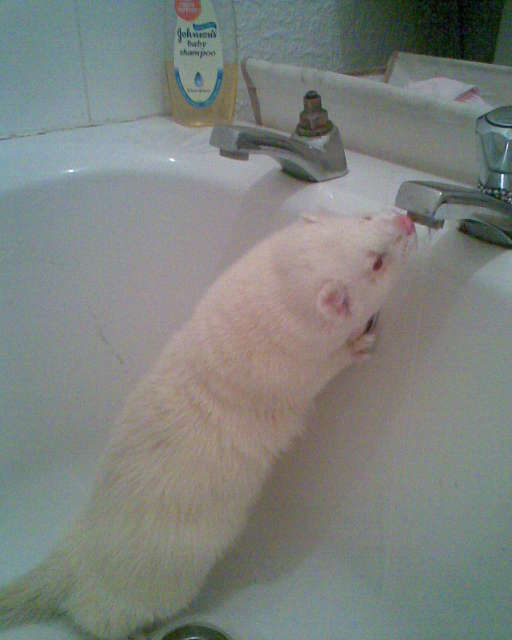 ferret love
Question
snert
hi my name is john from england i had to
ferret love
Question
snert
hi my name is john from england i had to
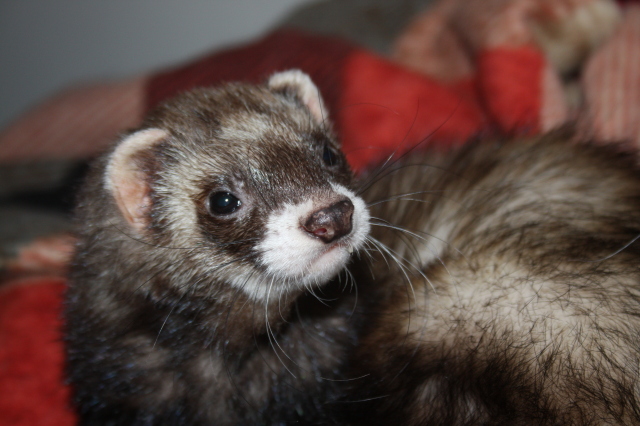 odd shedding pattern
Questionferret
QUESTION: Hi Jacquie,
I have a q
odd shedding pattern
Questionferret
QUESTION: Hi Jacquie,
I have a q
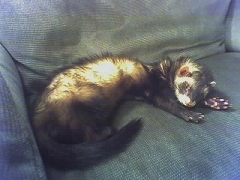 SWOLLEN FEMALE PARTS
QuestionSmokey napping
QUESTION: Hello, I have a
SWOLLEN FEMALE PARTS
QuestionSmokey napping
QUESTION: Hello, I have a
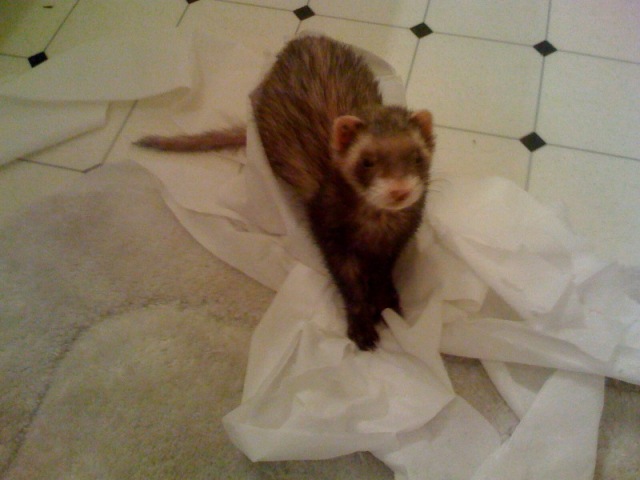 Elderly ferret
Question
Booger
Hi,
I rescued an older ferret named Bo
Elderly ferret
Question
Booger
Hi,
I rescued an older ferret named Bo
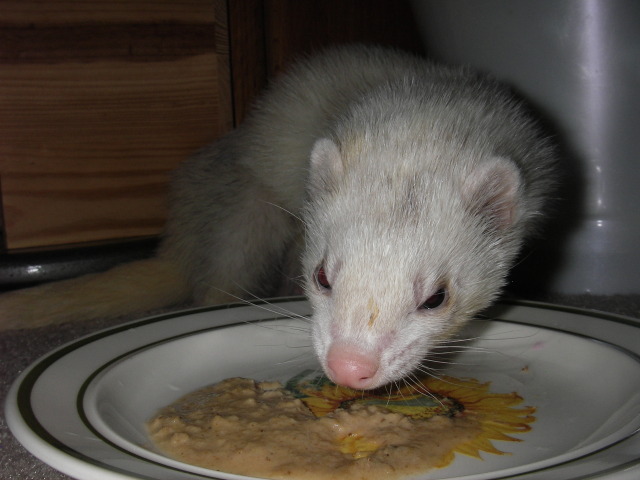 vomiting ferret that is otherwise happy
QuestionQUESTION: Dear Emilee,
first of all, you and yo
vomiting ferret that is otherwise happy
QuestionQUESTION: Dear Emilee,
first of all, you and yo